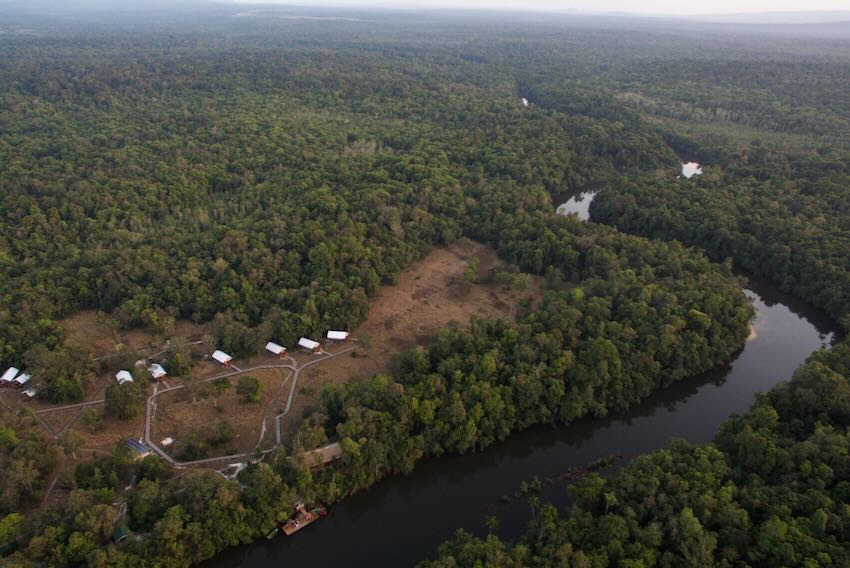
Instead of a trends piece for next year we wanted to reflect on what could have been done better this year. Throughout 2024 we have reported on what hotels, suppliers and organisations across the sector have done regarding their sustainability initiatives and strategies, but there is little dialogue about what could have been done better – or what lessons have been learned. We put the following question to some leading voices in the travel, hotel and sustainability arena.
“What could the industry have done better this year?”
Glenn Mandziuk, CEO World Sustainable Hospitality Alliance
“This year the industry has showcased its commitment to driving Net Positive Hospitality – engaging with the Alliance, showcasing pre-competitive collaboration and importantly, acting. But with that in mind, we must move faster. We are just five years from 2030 and by that point the hotel industry needs to reduce its carbon emissions by 66 per cent per room. The industry will need to go even further to help limit warming to 1.5oC and avoid the very worst impacts of climate change. We must hit our targets and fulfil our commitments to Net Positive and pick up the pace of change.”
Amber Westerborg, director of sustainability & impact at The Social Hub
“The hotel industry is definitely moving in the right direction, but can still raise the bar. It’s time to move on from the basic measures like swapping plastic straws or towel reuse programmes – guests expect more. We need to really move towards true substantial impact, making significant changes that will transform the business model – rethinking supply chains, supplier partnerships, and the guest experience itself.
“At The Social Hub, we’re committed to embedding sustainable practices into our core operating model, making sure we manage our environmental impact and use our position to support our community. Becoming a B Corp underscores our commitment to balancing purpose and profit. It’s not just about certifications though – it’s about driving systemic change. The hospitality sector must evaluate material topics like energy use, waste management, and the carbon footprint of its operations.
“We’ve also noticed that while guests may not yet fully prioritise sustainability certifications when booking, their expectations for responsible practices are growing rapidly – and the industry needs to respond. This is why hotels must go beyond surface-level efforts and integrate sustainability into every aspect of their operations. By prioritising meaningful action and bold innovation, the hotel industry can move from simply reacting to challenges to proactively shaping a sustainable future.”

Austin Eaton, Clean the World
“While there has certainly been an increased focus on sustainability within the UK hospitality industry this year, translating words and intentions into meaningful action remains a key area for improvement in 2025. Too many conversations lack follow-through due to limited time, resources, and a failure to recognise the true value of sustainability.
“At Clean the World, we conducted an analysis this year to better understand guest expectations and values surrounding sustainability during their stay. The results revealed a significant gap between guests’ desires for sustainable travel and their confidence in hotels’ environmental commitments highlighting a crucial point: integrating sustainable initiatives is no longer a luxury but a necessity. My biggest reflection and advice for hoteliers would be to ask the right questions, find the solutions, and, most importantly, take action. Start with that first step.”
Randy Durband, GSTC CEO
“The past year has seen strong progress in more widespread application of sustainability practices in the hospitality industry. However, one could argue that the progress was from a less than stellar base, and most of the progress seems to be from either large, well-known international brands or smaller luxury brands. The vast numbers of independent or smaller-brand chains seem to be doing less.
“But we don’t know any of that with certainty because of the very limited amount of external review. The WTTC Basics is gaining traction as a starter programme to get properties moving forward on two fronts — improving practices in core areas of sustainability and to develop the measurement and reporting sills needed to gain a degree of external verification of compliance to those elements. Moving upward to certification of a holistic standard such as the GSTC Criteria and the many GSTC-Recognized standards is now growing at a greater pace, but again from a too-small bases. So there has been good movement in 2024, but we need far more properties moving forward more quickly.
“More generally in tourism beyond hospitality, we see a similar pattern of excellent movement among a limited number of brands, and hope for much wider adoption of holistic approaches to sustainability by many more players in the near term.”
Sarah Habsburg, sustainability consultant for responsible hospitality and training for SMEs
“I believe the industry could have taken a more effective approach to communicating the EU Green Claims Directive. It has created a challenging environment, particularly for SMEs, with many business owners commenting that they feel overwhelmed by unclear guidance and have hesitated to take action, therefore stalling progress in sustainability.
What I learned is in fact the confirmation of a suspicion that the main obstacles towards continuous sustainability action in the SME hospitality sector are money and time. Many are already making notable strides: paying fair wages, sourcing locally, raising awareness about resource use, and excelling in social sustainability through community initiatives. However, they often lack the funds to invest in technology for accurate resource monitoring or the time to develop the necessary skills for long-term commitment.
In conclusion, I have accepted that, while our own influence is mighty and can reach many people around us, it is at the same time limited and will not change the world overnight. However, what does have a significant impact is my insistence that, by learning how to intentionally apply a responsible lens to every business (and life) choice we make, can generate positive change where it matters – albeit one decision at a time.”
Joanne Taylor-Stagg general manager, and Kai Parfitt ESG manager, The Athenaeum, London
J T-S: “Stop waiting for guests to drive your sustainability journey, there is so much you can do now and the guest often doesn’t even realise; energy, water or carbon reduction as an example. More circularity across the hotel operation whether it is with suppliers, within the operation or processes that they follow.
“What can the world do better? Start to value clean water. We are too wasteful and treat water as a commodity. This will change in the future if we do not act, and there are countless examples across the globe of droughts and developed countries are not immune to this. London is forecasted by the Environment Agency to run out of water within 25 years.”
KP: “Guest journeys at hotels need to have more organic sustainability education filtered throughout the stay in the form of storytelling. More subtle messaging at check-in, at the restaurant, and in rooms will help. Being part of environmental initiatives that invoke storytelling can play a crucial role, an example we have at the Athenaeum Hotel is our partnership with Belu Water (a social enterprise that donates all its net profits to WaterAid), we have a scheme called positive profits whereby every bottle of water sold we donate 50 per cent of the sale to Belu.
“The holy grail is having a complete operations team that feels empowered to talk about sustainability in a manner that is organic, fluid, and comes naturally to them. In the same way an F&B colleague feels comfortable talking about the menu or the wine list, ensuring your team has the same confidence to tell stories about sustainability. This sends a powerful message to our guests, and we often forget that our direct sphere of influence is vast, this education could provide a really influential butterfly effect for an individual in a different industry. I equally think there is another education piece specifically around luxury and sustainability, how they can thrive together and we need to change the narrative that sustainability is being ‘cheap’.”
Bryan Oknyansky, senior architect & head of sustainability at Studio Moren
“Reflecting on 2024, there’s one thing I think the industry could’ve done better to realise greater efficiencies and value for money in undertaking sustainable development – instigating a pre-appointment sustainability brief not solely focused on compliance.
“Planners are increasingly requiring developers to report on what happens over a building’s lifetime and referencing unofficial sustainability guidance as best practice. You routinely ask us to look into the future and estimate a programme to practical completion, and I think it should also be routine to ask your team what needs to be done to plan for a building’s end-of-life, to design out demolition today for 60 years – hopefully, hundreds! – down the line. And as your architect, this is precisely what you should expect from me.
“The inclusion of measurable directives for reducing carbon emissions and resource waste, and implementing early-stage actions of sustainability assessments like BREEAM, pre-appointment, would have reduced costs and simplified compliance for many owners and developers in 2024. I know it’s only a matter of time before this is commonplace as I’ve recently seen an increase in requests from clients to advise on their project-specific sustainability briefs. For sustainability, the adage should be “knowledge is profit – financial, social and environmental”.
Tinu Mathur, founder and chief creative Mathur & Co
“It is great to see progress on sustainability within the hospitality sector. The general awareness is up, there is a lot standard communication that is well intentioned, but what does that really mean? Consumers are increasingly fatigued by ‘sustainability’ messages as the intention seems to be diluted. Hotels can improve in the future by providing more context to their guests, their staff, their partners and the community they operate in.
“Augmenting the ‘what’ needs to be done, it is imperative that they share the ‘why’ it is important. We all understand the high level of the fragile state of our planet, the inequality in society, the need for change… but do we understand the impact of our little contributions how that can slowly rehabilitate the communities around us? The hotel plays an important part in that education through simple information about the potential positive outcomes.
“By inviting its constituents to understand the “why” it provides more context to the “how” and “what”. Show specifics of local impact to create engagement.”
Debbie Hindle, chair International Centre for Responsible Tourism global
“The hospitality industry is doing many amazing things. The winners of our Global Responsible Tourism Award included the Sivatel Bangkok Hotel, Crees Manu in Peru, Jetwing Hotels in Sri Lanka and Grootbos Lodge in South Africa. All are inspiring examples of the great work being done in local sourcing, upskilling communities, and climate action.
“But what could the sector do better? I feel that many hotels could take even more responsibility for sustainability. The elephant in the room for everyone in hospitality is the carbon impact of their guests’ travel.
“Most hoteliers working in this space appear to be intently focused on their own properties, supply chains and educating guests on arrival. But if a hotelier can lift their eyes up to the global impact that we are all having, then they should read The Travel Foundation’s Envisioning Tourism in 2030 report. This modelled all the levers we have as a global industry for reaching net zero. It concluded the main way we’ll do this is if people to take fewer long-haul trips. That means hotels can’t just concentrate on their own circularity, but they also need to do more to review their guest mix and address the balance of long-haul and short-haul guests.
“This is a difficult challenge, but now is the time to plan to change. It’s time to focus more resources on increasing local and short-haul guests and encouraging longer stays.”
Natalie Campbell MBE, CEO Belu
“People could be more honest. It’s a very nice industry and I challenge the businesses that I speak with to be honest about their buying priorities. If they are buying based on price – they should just say so. Don’t then join a panel talking about how ‘sustainability’ and ‘provenance’ and ‘British’ are your top three internal values, if ultimately as soon as we open the cupboard door everything is bought on price and it’s all imported because they can get a better price.
“As soon as we are honest about this the market can adapt. I’m not saying they are wrong, because they are businesses at the end of the day, but just be honest.
“As a business we have spent a long time being very nice and we’ve never called out any other brand or operators for not walking the walk. So people will see a very different sort of Belu next year. And next year we will also be spotlighting our customers, our partners and our supply chains a lot more to say ‘this is what it means to be a sustainable business, and this is what it means be part of a movement of people really doing good'”.
Jo Geneen, sustainability consultant
“This year we’ve seen countless climate-related events impacting everyday lives, including top tourism destinations. We know that as an industry we need to accelerate, work together pre-competitively, and get our heads around new reporting rules across the EU and beyond. These are organisational challenges that are swiftly becoming business as usual.
“How do hotels and suppliers ensure they are making daily decisions that positively impact people and the planet? One way could be through considering board structures and decision-making, or governance powers. The ‘Nature on the Board’ movement is one that as far as I know none of our industry has taken up so far (I would be happy to be corrected on this!). There are some great companies outside hospitality which are really incorporating Nature into their board including Patagonia which has Nature as a shareholder, and gives a vote to nature through the Patagonia Purpose Trust, and Tony’s Chocolonely through its ‘Golden Share’ and Mission Lock.
“We say that sustainability should now be in everyone’s remit in your company – from chef to C-suite, landscaping to legal. We can do better in 2025 by taking inspiration from beyond our industry, and building governance structures that benefit all, including nature.
“I would like to point you to this great resource: Toolkit, Onboarding Nature by B Lab Benelux, Nyenrode University and the Earth Law Center.”
Tim Davis, managing director, PACE Dimensions
“Consumers are becoming ever more “values driven” in buying behaviour and hotel brands have not really innovated with much momentum to harness and capitalise on this trend. The brands that have grasped this opportunity have been able to translate it into brand attributes to build greater affinity, brand preference and premiums.
“Could the industry have done better? Hotel companies should balance their focus by building longer term strategies as well as addressing short term business needs quarter by quarter.
“Place broader ESG strategy and its positive impact centrally to storytelling – Few hotels effectively place ESG credentials as part of storytelling in sales and marketing communications. And when they do, it is often not linked well, or with sufficient relevance to influence buying behaviour. Research proves and quantifies the opportunity here for hotels, yet most have been slow to understand the trends and embrace working with industry bodies to define standards, measures, and report hotel results to inform choice. By accelerating this and then communicating its benefit and link to what consumers care about, it can foster brand preference and help grow demand in an increasingly competitive market.”
Sarah Duncan, ESG consultant, Sleeping Lions
“When it comes to sustainability or ESG, being preachy and judgmental really is not my style. I prefer a more empathetic and supportive approach. But it still frustrates me that there remains such a big gap between good intent and action – what I am now calling the “I’d love to do more but…” syndrome.
“So long as sustainability remains outside ‘business as usual’, it will continue to be easy to de-prioritise, allowing people to focus on all the perceived barriers such as lack of time, resource, budget, knowledge, and so on.
“It is understandable that people regard it as hard, but in truth it doesn’t have to be. You simply need to get going and view it in the context of progress, not perfection. Take one step at a time.
“My 2024 report card on the industry would read: …. is easily distracted. If they want to make progress in this subject, they need to put things into practice rather than just showing a basic interest in the theory. Only that way will it become second nature.
“This is why some industry friends and I have created ESGinAction.com. It’s very much a work in progress, but we hope to build up the content in 2025 to help people make significant progress. It’s all about “collaboraction”, the industry working together to drive action.”
Willem Niemeijer, CEO & founder, YAANA Ventures
“At YAANA Ventures we believe that carbon offset schemes, while valuable, should not overshadow the actionable steps travel companies and accommodations can take daily to minimise environmental impact and create long-term value. The travel industry sometimes leans on offsets as a “quick fix,” rather than prioritising regenerative practices within operations. For us, meaningful sustainability lies in tangible, on-the-ground efforts.
“At Anurak Lodge, our Rainforest Rising project restores native forest ecosystems right on the property, providing a living example of reforestation in action. At Visama Mae Chan, we focus on similar rewilding efforts to regenerate degraded lands. At Cardamom Tented Camp (pictured below), we directly fund and support forest rangers who protect 18,000 hectares of critical lowland rainforest, effectively preventing deforestation and poaching.
“In 2025, YAANA Ventures’ sustainability strategy will double down on regenerative travel, emphasising the goal of leaving destinations in a better condition than before our visit.”


